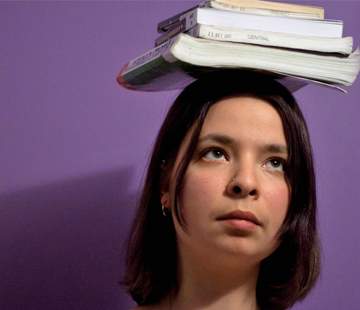A study out of the University of California Santa Barbara (UCSB) recently came out that showed how a two-week mindfulness training improved students GRE reading-comprehension scores and working memory, while reducing mind wandering among students prone to distraction. Of course, this story went viral because of the value our culture places on test scores over almost anything else, including mental health. But underneath the better tests scores, this study reveals something far more important: It suggests that with practice, teens can rewire the ability to regulate attention and stress. In today’s academic race to nowhere, that might mean the difference between just surviving and thriving.
In my mind, it all comes down to stress.
Kids nowadays are under a tremendous amount of stress with a push from our educational institutions and from parents to get the best grades, do the most extracurricular activities and conform to fit into the highest social circles.
Families don’t seem to have the time they used to have. The kids are so booked with activities that a 20-minute dinner together as a family is a major accomplishment. Many of those 20-minute dinners are then interrupted with everyone’s miniature media boxes intruding with texts, Facebook messages, tweets or sports scores. I’d say phone calls, but who does that anymore.
What happens is that the adolescent brain (as does the adult brain) defaults to certain ways to cope with this high level of stress. These unhealthy habits include, but are not limited to: Procrastination, over-eating, under-eating, isolating, self-harm, sleeping too much, not sleeping enough, working harder into the night at the expense of health, worrying and at times, the extreme attempt of suicide.
It’s hard to focus on a test when all this is going on.
When my wife, Stefanie Goldstein, PhD and I created the CALM program—Connecting Adolescents to Learning Mindfulness—we were floored to hear their stories in going through a mindfulness curriculum.
“From this class I learned about mindfulness, how to communicate better, how to manage stress, and how to be more compassionate with myself and others.” —Anna, age 17
“I was very amazed and happy at the effects mindfulness has had on my panic, focus, and mood.” —Paula, age 16,
“Mindfulness, for me, has become a practice in my life that helps me to have some perspective over my feelings instead of being lost in the middle of it all. It makes feelings less confusing.” —Lana, age 17
“A word I would use is “refreshed” because that is what I feel being in this class, coming from a long week and everything that leads up to the class.” —Brandon, age 15
If you’ve read any of my work you know I often reference a quote that has been attributed to Viktor Frankl:
“Between stimulus and response there is a space. In that space likes our power to choose our response, in our response lies our growth and freedom.”
Mindfulness trains us to see that space and enter into it, seeing the “choice point” for a healthier coping response.
While we now know that we can influence neural growth throughout the lifespan, the teenage years are a time of intense synaptic pruning. This is the time of “use it or lose it.” That means it is an opportune time to have an influence on the strength of neural connections.
That’s why it’s so important to bring mindfulness into our educational systems, the future will be far better for it.
Here’s a link to a short practice to give to yourself or a teen near you, to not only get better test scores, but to influence a stronger and healthier brain.
As always, please share your thoughts, stories and questions below. Your interaction creates a living wisdom for us all to benefit from.
Adapted from Mindfulness and Psychotherapy






